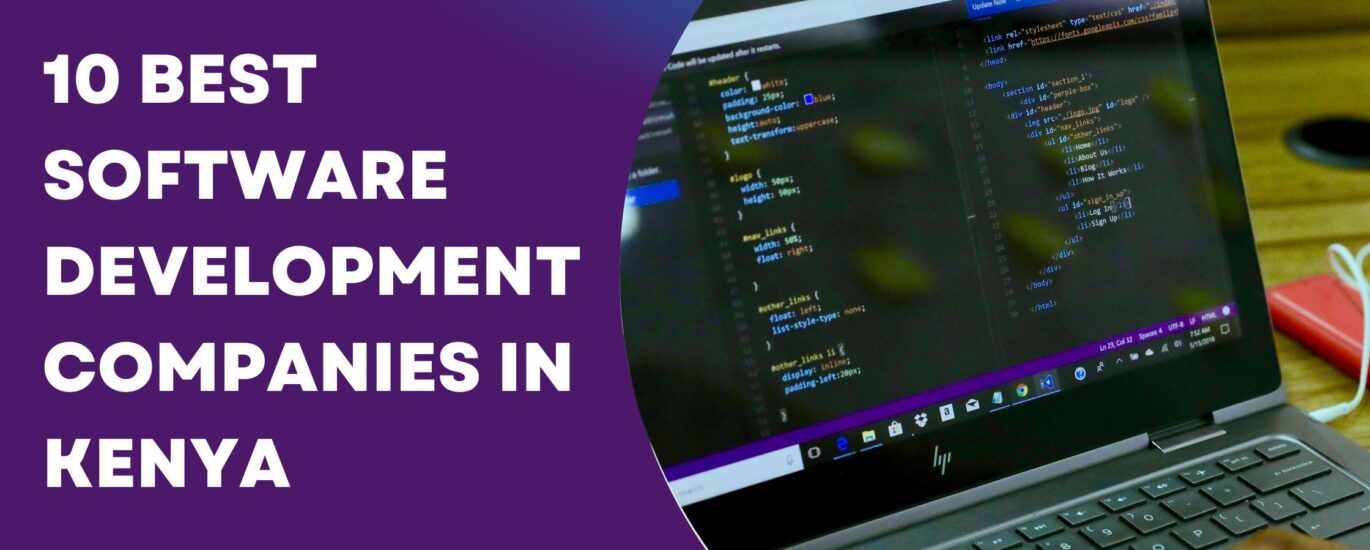Kenya has rapidly emerged as a leading tech hub in Africa, with Nairobi often referred to as “Silicon Savannah.” The country is home to numerous innovative software companies that are making significant contributions to the global technology landscape.
Today we will explore the ten best software development companies in Kenya, offering a closer look at their services, expertise, and why they stand out in the competitive tech industry. first, let’s discuss a criterion for you to pick the right company for your project.
How to Evaluate Software Development Companies
Choosing the right software development partner is a critical decision that can significantly impact the success of your project. Here’s a comprehensive guide on how to evaluate mobile and web app developers Kenya.
1. Portfolio and Case Studies
A company’s portfolio is a window into their past work and expertise. When evaluating potential partners, closely examine their portfolio to see if they have experience in projects similar to yours. Look for case studies that highlight how they approached challenges, their problem-solving capabilities, and the results they delivered.
For instance, if you’re looking for mobile app developers in Kenya, check whether the company has successfully developed and launched mobile applications that are similar to your vision. A strong portfolio with diverse projects is usually a good indicator of a company’s ability to adapt and deliver quality work.
2. Client Testimonials and Reviews
Client testimonials and online reviews provide valuable insights into a company’s reputation and reliability. Positive testimonials often reflect a company’s commitment to customer satisfaction and their ability to deliver on promises.
Look for detailed reviews that discuss specific aspects such as project management, communication, and post-launch support. If possible, reach out to past clients directly to get a firsthand account of their experience with the company. This step can help you gauge whether the company is capable of meeting your expectations.
3. Technical Expertise and Innovation
Technical expertise is a crucial factor when evaluating software companies in Nairobi. Ensure that the company has the necessary technical skills and experience in the technologies relevant to your project. For example, if you need a web application built using a specific framework like React or Angular, the company should have developers who are proficient in that technology.
Additionally, inquire about their approach to innovation. A company that stays updated with the latest trends and technologies is more likely to offer solutions that are both current and future-proof.
4. Communication and Project Management
Effective communication and project management are key to a successful collaboration. Evaluate how the company manages communication. Check whether they have a dedicated project manager, how often they provide updates, and how they handle feedback.
A well-organized company will have a structured approach to project management, ensuring that timelines are met, and any issues are promptly addressed.
5. Cost and Value
While cost is an important consideration, it should not be the sole deciding factor. Evaluate the value that the company offers for the price. A lower cost might mean compromises in quality, while a higher cost could indicate a more experienced team and better support. Consider the long-term value of the solution they provide and whether it aligns with your budget and business goals.
By carefully evaluating these factors, you can choose a software development company that not only meets your technical needs but also aligns with your business objectives.
Emerging Trends in Software Development in Kenya
Kenya’s software development industry is evolving rapidly, with several emerging trends shaping its future. These trends are driven by technological advancements, changing consumer behaviors, and the increasing demand for digital solutions across various sectors.
Here are some of the most notable trends in the industry:
1. Artificial Intelligence (AI) and Machine Learning
AI and machine learning are becoming integral to software development in Kenya. Companies are increasingly incorporating these technologies into their solutions to enhance functionality, improve user experience, and drive efficiency. For example, AI-powered chatbots are being used in customer service, while machine learning algorithms are helping businesses in data analysis and predictive analytics.
As AI technology continues to advance, its adoption in the Kenyan software industry is expected to grow, leading to more intelligent and automated solutions.
2. Blockchain Technology
Blockchain is another emerging trend in Kenya’s software development landscape. The technology is being explored for its potential to provide secure, transparent, and decentralized solutions across various industries.
Fintech companies are leveraging blockchain for secure transactions and smart contracts, while other sectors are exploring its use in supply chain management and digital identity verification. We expect to see wider adoption and more innovative applications emerging from software developers.
3. Mobile-First Solutions
With the majority of Kenyans accessing the internet via mobile devices, the demand for mobile-first solutions is on the rise. Mobile app developers in Kenya are focusing on creating applications that are optimized for mobile users, offering seamless experiences regardless of device or location.
This trend is particularly strong in sectors like e-commerce, banking, and social networking, where mobile accessibility is crucial. The emphasis on mobile-first development is likely to continue, given the increasing penetration of smartphones and mobile internet in the country.
4. Cloud Computing and SaaS (Software as a Service)
Cloud computing is gaining traction in Kenya as businesses seek scalable and cost-effective solutions for their IT needs. Software companies in Kenya are increasingly offering cloud-based services, including SaaS products that allow businesses to access software over the internet without the need for on-premise installations.
The trend is driven by the flexibility, scalability, and reduced operational costs associated with cloud computing. As more businesses migrate to the cloud, the demand for cloud-native applications and services is expected to grow.
5. Focus on Cybersecurity
As digital transformation accelerates, cybersecurity has become a top priority for businesses in Kenya. Software development companies in Nairobi are investing in robust security measures to protect their clients’ data and systems from cyber threats.
The measures include the development of secure applications, the implementation of encryption protocols, and the use of advanced security tools to detect and mitigate threats. The growing awareness of cybersecurity risks is driving the adoption of best practices and the development of security-focused solutions.
6. Internet of Things (IoT)
The Internet of Things (IoT) is gradually making its way into Kenya’s software development scene. IoT involves the interconnection of physical devices that collect and exchange data over the internet.
Software developers in Kenya are exploring IoT applications in areas such as smart homes, agriculture, and healthcare. As IoT technology becomes more accessible, we can expect a rise in the development of IoT-enabled solutions that address local challenges.

The Best Software Development Companies in Kenya
1. Muva Technologies
Muva Technologies is one of the leading software development companies in Kenya known for its innovative and tailored software solutions. The company specializes in creating custom software that addresses specific business needs, helping organizations to optimize their operations and achieve their goals.
Muva Technologies offers a wide range of services, including web development, mobile app development, and enterprise software solutions. Muva’s commitment to delivering high-quality, customized solutions has earned them a reputation as a leader among software companies in Nairobi.
2. Andela
Andela connects software developers in Kenya with global organizations, helping them build scalable platforms and innovative solutions. Andela’s rigorous selection process ensures that only the best developers are matched with international clients, making it a trusted partner for companies seeking high-quality software development.
3. Craft Silicon
Craft Silicon is a well-established software company in Nairobi that specializes in financial software solutions. With a strong focus on the banking and financial services sector, Craft Silicon has developed innovative products that have transformed how financial institutions operate across Africa. Their core banking system is used by major banks in East Africa, enabling them to manage operations efficiently across multiple countries.
Craft Silicon’s ability to deliver robust, scalable, and secure solutions has made it a trusted partner for financial institutions seeking to innovate and grow. Their expertise in financial software positions them as a top-tier software development company in Nairobi
4. iHub
iHub is more than just a software development company; it is a community and innovation hub that fosters tech entrepreneurship in Kenya. iHub has played a significant role in the growth of the Kenyan tech ecosystem by providing a collaborative environment for startups, developers, and investors. They have been instrumental in developing mobile applications and platforms that address local challenges, particularly in healthcare and education.
5. BRCK
BRCK is a pioneering company that focuses on providing connectivity solutions in emerging markets. Their flagship product, the SupaBRCK, is a rugged device designed to provide reliable internet access in areas with limited infrastructure. BRCK combines hardware and software development to create solutions that bridge the digital divide in Africa.
6. Seven Seas Technologies
Seven Seas Technologies is a software development company in Kenya with a strong focus on the healthcare sector. They provide end-to-end IT solutions that include software development, system integration, and IT infrastructure management. Their healthcare solutions are designed to improve patient care, streamline hospital operations, and enhance the efficiency of healthcare services.
7. Fintech Kenya
Fintech Kenya specializes in developing financial technology solutions that cater to the needs of both traditional financial institutions and fintech startups. Their expertise in mobile banking, payment systems, and digital wallets has made them a key player in the Kenyan tech scene.
8. Dotsavvy
Dotsavvy is a digital agency that offers a wide range of services, including web development, digital marketing, and software development. With a strong focus on user experience and digital strategy, Dotsavvy helps businesses create engaging online platforms that drive growth and customer engagement.
9. Uhasibu
Uhasibu is a Kenyan software company that specializes in developing cloud-based accounting software for small and medium-sized enterprises (SMEs). Their flagship product, also called Uhasibu, is designed to simplify accounting processes and provide SMEs with the tools they need to manage their finances effectively.
Uhasibu’s cloud-based solution is accessible from anywhere, making it ideal for businesses that need flexibility and ease of use. Their focus on providing affordable, user-friendly software for SMEs has made them a leader in the accounting software space in Kenya.
10. Mesozi
Mesozi is a technology company that offers a range of services, including software development, data analytics, and IT consulting. They are known for their innovative solutions in sectors such as healthcare, finance, and logistics. Mesozi’s team of software developers is skilled in creating customized software that meets the unique needs of their clients.
The Future of Software Development in Kenya
The future of software development in Kenya looks promising, with several factors poised to drive the industry’s growth and evolution. As Kenya continues to position itself as a technology hub in Africa, the software development industry is expected to play a critical role in shaping the country’s digital future. Here’s what the future holds for software companies in Kenya:
1. Increased Government Support
The Kenyan government has recognized the importance of the tech industry in driving economic growth and has introduced various initiatives to support the sector. These include investments in technology infrastructure, the establishment of innovation hubs, and the development of policies that encourage tech entrepreneurship.
As government support continues to grow, software development companies in Nairobi and other regions can expect a more conducive environment for innovation and growth. This support will likely lead to more startups, increased investment in research and development, and the creation of new technologies.
2. Growing Pool of Skilled Developers
Kenya’s educational institutions are increasingly focusing on technology and software development, producing a growing pool of skilled developers. Additionally, companies like Andela and iHub are providing training and mentorship programs to enhance the skills of young developers. Consequently, software developers in Kenya will become even more competitive on the global stage. The growing talent base will drive innovation and enable Kenyan companies to take on more complex and diverse projects, both locally and internationally.
3. Expansion of Tech Hubs
Tech hubs like Nairobi’s iHub have played a pivotal role in the growth of Kenya’s software development industry. These hubs provide a collaborative environment for developers, entrepreneurs, and investors to come together and create innovative solutions. The hubs will not only foster innovation but also attract investment, both from within Kenya and internationally, solidifying Kenya’s reputation as a leading tech hub in Africa.
4. Global Recognition and Partnerships
Kenya’s software development industry is increasingly gaining recognition on the global stage. International companies are looking to Kenya as a destination for outsourcing software development due to its skilled workforce, cost-effectiveness, and innovative solutions. This global recognition is likely to lead to more partnerships between Kenyan companies and international firms, providing opportunities for knowledge exchange, joint ventures, and access to new markets.
5. Focus on Sustainability and Social Impact
As the software development industry in Kenya grows, there is an increasing focus on sustainability and social impact. Companies are developing solutions that address pressing social and environmental challenges, such as access to education, healthcare, and clean energy. The trend will not only contribute to Kenya’s development goals but also position the country as a leader in socially responsible technology development.
6. Adoption of Emerging Technologies
The future of software development in Kenya will be shaped by the adoption of emerging technologies such as AI, blockchain, IoT, and cloud computing. These technologies will drive innovation and open up new opportunities for software developers in Kenya.
As businesses and consumers become more tech-savvy, the demand for advanced solutions that leverage these technologies will increase. Companies that can stay ahead of the curve and integrate these technologies into their offerings will be well-positioned for success in the future.
Tips for Collaborating with a Software Development Company
Collaborating effectively with a software development company in Kenya is essential to ensure the success of your project. Whether you’re working with a team in Nairobi or remotely managing developers, following these tips can help you build a productive partnership:
1. Establish Clear Communication Channels
Communication is the cornerstone of any successful collaboration. From the outset, establish clear communication channels that allow for regular updates and feedback. This could involve setting up weekly meetings, using project management tools like Trello or Asana, and ensuring that everyone is on the same page regarding project goals and timelines.
It’s also important to clarify the preferred communication methods, whether it’s via email, instant messaging, or video calls. Effective communication helps prevent misunderstandings, keeps the project on track, and ensures that any issues are addressed promptly.
2. Define Expectations and Scope Early On
Before the project begins, take the time to clearly define the scope, deliverables, and expectations. This includes outlining the specific features and functionalities you need, the project timeline, and the budget. A well-defined scope helps prevent scope creep, where additional features or changes are added mid-project, leading to delays and increased costs.
Be as detailed as possible in your initial brief, and make sure that the development team fully understands your requirements. This alignment from the start sets the stage for a smooth and successful collaboration.
3. Foster a Collaborative Environment
Encouraging a collaborative environment where ideas can be freely exchanged is key to innovation. Involve the development team in the brainstorming and decision-making processes, and be open to their suggestions.
Software developers often have valuable insights that can enhance the final product. By fostering a collaborative atmosphere, you can leverage the team’s expertise to create a solution that not only meets your needs but exceeds your expectations.
4. Be Flexible and Open to Feedback
Flexibility is important when working with a software development company. As the project progresses, you may need to make adjustments based on new information, changing business needs, or feedback from the development team.
Being open to feedback and willing to adapt your initial plans can lead to a better end product. Remember that the development process is iterative, and improvements often emerge through testing and refinement.
5. Maintain Regular Progress Checks
Regularly monitoring the project’s progress is crucial to ensure it stays on track. Schedule milestone reviews and progress checks at key stages of the project. These reviews provide an opportunity to assess the work completed, address any issues, and make necessary adjustments. It’s also a chance to ensure that the project is aligned with the initial scope and that all deliverables are being met. Regular progress checks help keep the project on schedule and prevent any last-minute surprises.
6. Ensure Clear Documentation
Proper documentation is essential for the smooth execution of the project and for future reference. Ensure that all aspects of the project, from the initial requirements to the final deliverables, are well-documented. This includes technical specifications, user guides, and any changes made during the development process.
Clear documentation not only aids in project management but also ensures that the software can be easily maintained and updated in the future.
7. Plan for Post-Launch Support
Finally, plan for post-launch support and maintenance. Even after the software is delivered and deployed, there may be bugs to fix, updates to implement, or new features to add. Discuss with the development company their approach to post-launch support, including how they handle bug fixes, updates, and ongoing maintenance.
Having a clear plan for post-launch support ensures that your software continues to function smoothly and remains up-to-date with any new requirements or changes in the market.
Conclusion
Kenya’s tech ecosystem is thriving, with numerous companies offering cutting-edge software development services. Whether you’re looking for web development companies in Kenya or specialized mobile app developers in Kenya, these ten companies represent the best of what the country has to offer. As the industry continues to grow, these software development companies in Kenya and beyond are sure to remain at the forefront of innovation.





